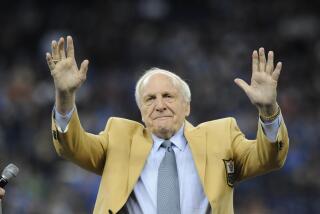Ted Lindsay, Hockey Hall of Fame member, dies at 93
- Share via
Ted Lindsay, whose toughness on the ice as a member of the Detroit Red Wings earned him the nickname “Terrible Ted” and whose persistent fight for NHL players’ rights cleared the way for them to enjoy better salaries and working conditions, has died at 93 while in hospice care. His death was announced on Monday by his son-in-law Lew LaPaugh, who oversees the Ted Lindsay Foundation.
Lindsay won the Stanley Cup four times with Detroit, starring alongside center Sid Abel — who was later replaced by Alex Delvecchio — and right wing Gordie Howe on a trio that was dubbed the Production Line for their high-scoring feats. Each was later elected to the Hockey Hall of Fame. Despite standing about 5 feet 8 and less than 165 pounds, Lindsay was fearless and often dirty. But he won the scoring title in 1950 ahead of Abel and Howe, and his competitiveness endeared him to Detroit fans.
“I hated everybody. I had no friends. I wasn’t there to make friends. I was there to win,” he told NHL.com in 2016. “It wasn’t necessary that I score, but I figured I could be an integral part without scoring. I had ability, I had talent and I didn’t have an ego that I thought I was great. I realized I had to earn it. That was my purpose: to be the best that there was at the left wing position.”
His activities in helping organize a players’ association so angered Red Wings general manager Jack Adams that Adams tried to discredit him and eventually traded him to the Chicago Blackhawks in 1957. Lindsay played three seasons for Chicago before retiring. He came back for a final season in Detroit in 1964-65.
Then-league president Clarence Campbell condemned Lindsay’s return as a stunt. “It’s the blackest day in hockey when a 39-year-old man thinks he can play in the fastest game in the world,” Campbell said. But Lindsay acquitted himself well by scoring 14 goals and 28 points as the Red Wings finished first in the six-team league.
For his career, Lindsay scored 379 goals and 851 points in 1,068 games and accumulated 1,808 penalty minutes. The Hall of Fame waived its usual three-year waiting period to induct him in 1966.
Lindsay later became familiar to American hockey audiences by working as an analyst on NBC’s telecasts in the early 1970s. His scarred face, souvenirs of his many fights, made him distinctive. He remained in the Detroit area and was involved in many charity efforts, with a special interest in autism research and education. He also appeared at NHL awards shows to present the Ted Lindsay award, which is given annually to the most outstanding player as voted by his peers.
Sign up for our daily sports newsletter »
“The National Hockey League mourns the passing and celebrates the incomparable life of the legendary Ted Lindsay,” Commissioner Gary Bettman said in a statement. “One of the game’s fiercest competitors during his 17-season NHL career, he was among its most beloved ambassadors throughout the more than five decades of service to hockey that followed his retirement. In Detroit, he was a civic icon.”
Donald Fehr, executive director of the NHL Players’ Assn., called Lindsay’s charity work “simply incredible and is a testament to Ted’s character. He simply never stopped giving back and helping others.” Fehr added, “All players, past, current and future, are in his debt. All those who have, and will follow him into the NHL, enjoy improved rights and benefits in large part due to the efforts he made.”
Lindsay was born in Renfrew, Canada. His father, Bert, played goal for one of the top teams in the early days of professional hockey, the Renfrew Millionaires.
Lindsay is survived by three children, a stepdaughter, six grandchildren, and three great-grandchildren.
More to Read
Go beyond the scoreboard
Get the latest on L.A.'s teams in the daily Sports Report newsletter.
You may occasionally receive promotional content from the Los Angeles Times.










